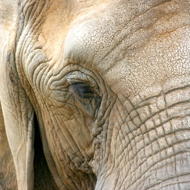Should we close our zoos?

Disturbing research findings suggest elephants in captivity live half as long as those in the wild.
As our knowledge of animal welfare expands, it raises difficult questions about the way animals are being kept in zoos. Alongside this, animals face increasing threats in the wild, driving many species to the brink of extinction.
A recent BBC Horizon programme asked, 'Should we close our zoos?' And if not, what changes do zoos need to make to ensure the welfare of their animals?
Copenhagen Zoo hit the headlines in 2014 after it culled a healthy two-year-old giraffe, Marius, prompting a huge public backlash.
Bengst Holst, the zoo's director of research and conservation, said he had been surprised by the protests, as culling of surplus animals has been done for more than 30 years. The practice has come about as a result of the modernisation of zoos, he explained, as animals are predominantly bred in captivity, rather than being taken from the wild, which inevitably results in surplus animals.
Copenhagen Zoo also allows its animals to reproduce, rather than using contraceptives, in the interest of allowing them to behave naturally. Before culling, the zoo will try to relocate the animals to another zoo, but space is limited.
It is not known how many zoos practice culling, but estimates suggest 3,000-5,000 animals are culled in European zoos each year.
Modern zoos may also have to reconsider the types of animals they keep. Traditionally, it is thought the public expect to see iconic animals such as lions, tigers and elephants. But Detroit Zoo sensationally broke with convention in 2004 when it decided to stop keeping elephants due to concerns their welfare needs could not be met.
Disturbing research findings suggest elephants in captivity live half as long as those in the wild.
Twycross Zoo director, Sharon Redrobe, however, believes zoos can do better to meet animal welfare needs. Stress and obesity have been highlighted as the two greatest risk factors for elephants in captivity.
Ms Redrobe said: "What will be really interesting will be to see baby [elephant] Esha when she grows up - will she have arthritis? I really hope not because we've changed the flooring, we've changed their diets so now we don't have fat elephants… The next generation needs to be protected and we learn from the past."
SeaWorld has attracted considerable criticism since the 2013 documentary, Blackfish, which told the story of Tilikum, a performing orca that killed three people while in captivity. Speaking to Liz Bonnin on Horizon, SeaWorld's chief vet Christopher Dold, said: "There is no evidence whatsoever that there is any mental aberration that is the result of living in a zoological park."
However, he called the current evidence "experiential" and said empirical evidence will come forward "over time". Since the programme was filmed, SeaWorld has announced it will end its orca breeding programme.
Stereotypic behaviours (abnormal, repetitive actions that are not seen in the wild) remain a problem for captive animals. Research has revealed a striking correlation between the amount of pacing seen in captive animals and the distance those animals would cover in the wild. Detroit Zoo has altered its polar bear enclosure, making it eight times larger and giving the animals an enhanced ability to make choices - at a cost of $16 million.
Professor Georgia Mason, from the University of Guelph, said the answer may not be simply making enclosures bigger. In the wild, animals would be making lots of decisions about where to go based on prey abundance, mate availability, etc. "It could be that really the solution for these animals is to allow them to make more decisions, give them more control, give them more day to day variability."
While some may feel zoos should become a thing of the past, renowned primatologist Dr Jane Goodall shared a different view during the programme. Since she first studied chimps in Tanzania in in 1960, the wild has shrunk considerably.
She said: "If the world is beautiful and like it was when I first went to Africa, that's where all chimps should be. But it's not. I've seen so many places where there's logging coming closer, chimpanzees under threat and quite honestly when you go to a really good zoo which has a big outside enclosure, you think well actually if I was a chimp I'd probably rather be here than out there in all those dangerous situations."
Many argue that zoos also have a role to play in the conservation of species being decimated in the wild. As Sharon Redrobe put it: "If we weren't breeding and maintaining animals, then some of these animals would be going rapidly extinct in the wild and we wouldn't have this ark principle, this repository of animals, to ever put them back. This is the role now of zoos and it's changed radically."
Whether zoos remain or not, it seems clear that the zoos of the future will have to change. As they prioritise animal welfare, it is likely they will have fewer animals, fewer species and visitors may not be able to get quite so close as they do now.



 The Veterinary Medicines Directorate (VMD) is inviting applications from veterinary students to attend a one-week extramural studies (EMS) placement in July 2026.
The Veterinary Medicines Directorate (VMD) is inviting applications from veterinary students to attend a one-week extramural studies (EMS) placement in July 2026.